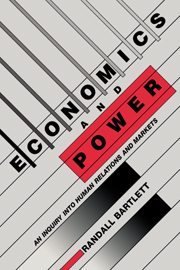1 - Power in economics
Published online by Cambridge University Press: 18 September 2009
Summary
That some people have more power than others is one of the most palpable facts of human existence. Because of this, the concept of power is as ancient and ubiquitous as any that social theory can boast. … one could set up an endless parade of great names from Plato and Aristotle through Machiavelli and Hobbes to Pareto and Weber to demonstrate that a large number of seminal social theorists have devoted a good deal of attention to power and the phenomena associated with it.
Robert A. Dahl, “The Concept of Power”Economics is about the quality of human lives. It is about what humans have, what they do, and how they interact with each other. It is a social science, indeed self-coronated as the “queen of the social sciences.” The measure of success in economic activity is the welfare experienced by human beings, in the broadest sense of the term. It is not just material things that affect persons, but the qualities of their relationships with each other. One characteristic of a relationship might be the presence of some form of “power.” One locus of a relationship might be an economic market. I have for several years been trying to understand what role power might play in market-based social interactions.
- Type
- Chapter
- Information
- Economics and PowerAn Inquiry into Human Relations and Markets, pp. 3 - 14Publisher: Cambridge University PressPrint publication year: 1989



